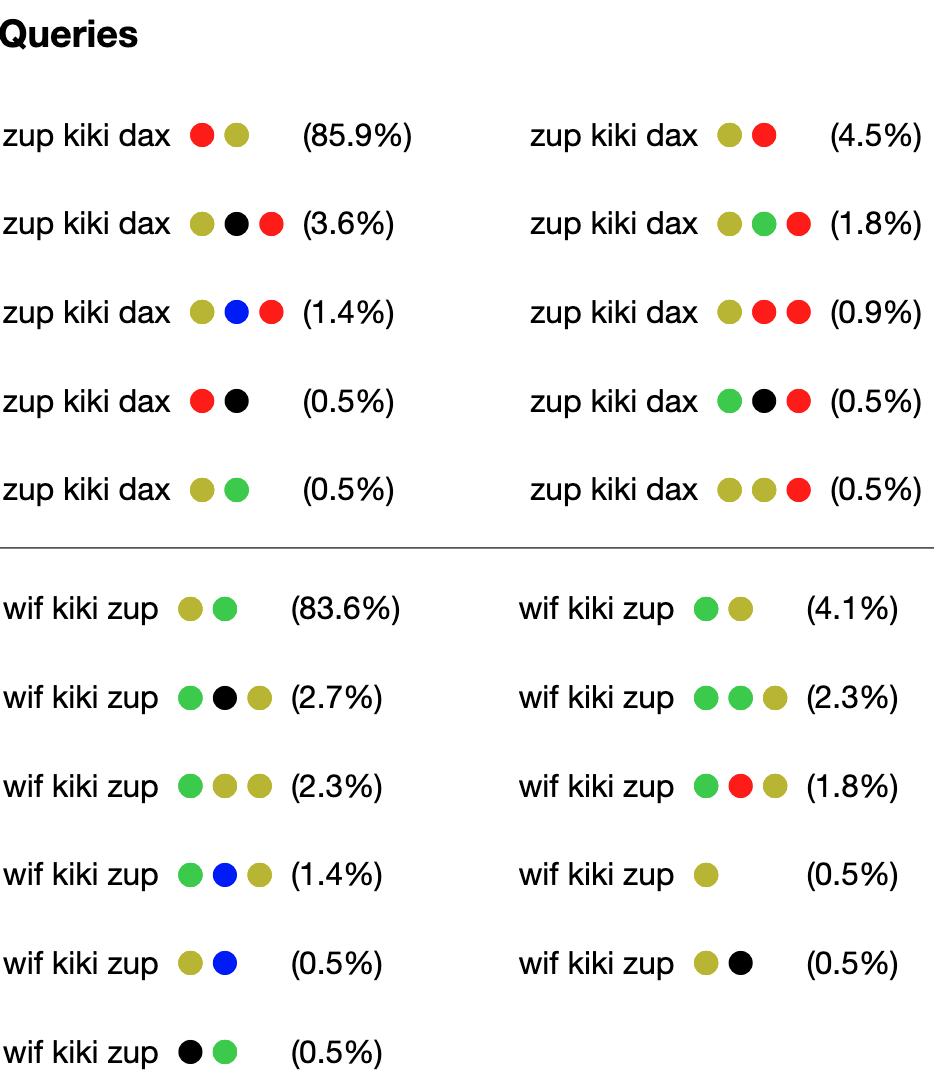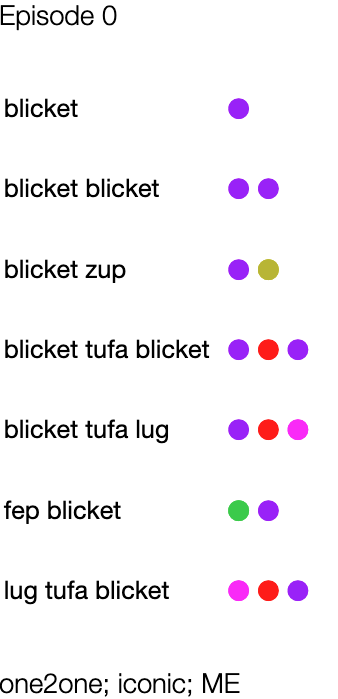Meta-Learning for Compositionality (MLC) is an optimization procedure that encourages systematicity through a series of few-shot compositional tasks. This code shows how to train and evaluate a sequence-to-sequence (seq2seq) transformer in PyTorch to implement MLC for modeling human behavior.
A separate repository here has code for applying MLC to machine learning benchmarks, including SCAN and COGS.
Note: Users can regard the acronym BIML as synonymous with MLC. The approach was renamed to MLC after the code was written.
Please cite the following article if you use any of this code in your work:
- Lake, B. M. and Baroni, M. (2023). Human-like systematic generalization through a meta-learning neural network. Nature, 623, 115-121.
This repo borrows from the excellent PyTorch seq2seq tutorial.
Python 3 with the following packages (install time within minutes): torch (PyTorch), sklearn (scikit-learn), numpy, matplotlib
The specific versions used for development: Python (3.7.9), PyTorch (1.10.1), sklean (0.24.2), numpy (1.21.5), matplotlib (3.3.2)
Meta-training data
To get the episodes used for meta-training, you should download the following zip file with the 100K meta-training episodes. Please extract data_algebraic.zip such that data_algebraicis a sub-directory of the main repo.
Pre-trained models
To get the top pre-trained models, you should download the following zip file. Please extract BIML_top_models.zip such that out_models is a sub-directory of the main repo and contains the model files net-BIML-*.pt.
There are many different ways to evaluate a model after training, each of which should take less than a minute on a standard desktop. Here are a few examples.
Here we find the best response from the pre-trained MLC model using greedy decoding:
python eval.py --max --episode_type few_shot_gold --fn_out_model net-BIML-top.pt --verboseHere we evaluate the log-likelihood of the human data:
python eval.py --ll --ll_nrep 100 --episode_type few_shot_human --ll_p_lapse 0.03 --fn_out_model net-BIML-top.ptTo evaluate the log-likelihood of all models and to reproduce Table 1 in the manuscript, you can run this command for the various models. Please see the table below for how to set the arguments in each case. Note that due to system/version differences, the log-likelihood values may vary in minor ways from the paper.
| --fn_out_model | --ll_p_lapse | --episode_type |
|---|---|---|
| net-basic-seq2seq-top.pt | 0.9 | human_vanilla |
| net-BIML-copy-top.pt | 0.5 | few_shot_human |
| net-BIML-algebraic-top.pt | 0.1 | few_shot_human |
| net-BIML-joint-top.pt | 0.03 | few_shot_human |
| net-BIML-top.pt | 0.03 | few_shot_human |
The models can be asked to mimic human responses on few-shot learning. To do so, the models sample from their distribution of possible outputs. A full set of samples from the models is available on this webpage. To reproduce the results for MLC (or other models), you can type the following to generate a HTML page.
python eval.py --episode_type few_shot_human_mult10 --sample_html --fn_out_model net-BIML-top.ptThen, after ensuring the right file name is listed under __main__ in the script analysis_few_shot.py, you can compare the human and machine mistakes
cd html_output/few_shot_human_mult10
python analysis_few_shot.pyThis should reproduce the hosted HTML file and numbers reported in the paper. Small variations may arise through version differences. Here is a snippet of the HTML and the text output.

Human responses (item accuracy):
DAX after 1 : 86.364
...
mean overall acc.: 80.739
mean acc. on simple queries: 85.479
mean acc. on complex queries: 76.0
mean acc. on len=6 queries: 72.5
perc. of errors that are one2one: 24.39 ; 10 of 41
perc. of errors (involving "after") that are iconic : 23.333 ; 7 of 30
Model responses (item accuracy):
DAX after 1 : 85.909
...
mean overall acc.: 82.376
mean acc. on simple queries: 86.252
mean acc. on complex queries: 78.5
mean acc. on len=6 queries: 77.75
perc. of errors that are one2one: 56.267 ; 211 of 375
perc. of errors (involving "after") that are iconic : 13.83 ; 39 of 282
Correlation for item accuracies: r= 0.788 ; p= 0.007
Generating HTML file: human_few_shot_behavior.html
The models can be asked to mimic human responses on the open-ended task. Again, a full set of samples from the models is available on this webpage. To reproduce the results for MLC, you can type the following two commands to generate a HTML page.
python eval.py --episode_type open_end_freeform --sample_iterative --fn_out_model net-BIML-open-ended-top.ptThen, after ensuring the right file name is listed under __main__ in the script analysis_freeform.py, you can compare the human and machine mistakes
cd html_output/open_end_freeform
python analysis_freeform.pyThis should reproduce the hosted HTML file and numbers reported in the paper. Small variations may arise through version differences. Here is a snippet of the HTML and the text output.

Human:
Processing 29 human participants.
Percent with perfect maps (consistent with 3 inductive biases): 58.621 ; N= 17 of 29
Percent with one2one maps: 62.069 ; N= 18 of 29
Percent with iconic concatenation: 79.31 ; N= 23 of 29
Percent with ME maps: 93.103 ; N= 27 of 29
Model:
Processing 100 model samples.
Percent with perfect maps (consistent with 3 inductive biases): 65.0 ; N= 65 of 100
Percent with one2one maps: 66.0 ; N= 66 of 100
Percent with iconic concatenation: 85.0 ; N= 85 of 100
Percent with ME maps: 99.0 ; N= 99 of 100
Generating HTML file: human_open_end_freeform.html
Generating HTML file: open_end_freeform_net-BIML-open-ended-top.html
The full set of evaluation arguments can be viewed with when typing python eval.py -h:
optional arguments:
-h, --help show this help message and exit
--fn_out_model FN_OUT_MODEL
*REQUIRED*. Filename for loading the model
--dir_model DIR_MODEL
Directory for loading the model file
--max_length_eval MAX_LENGTH_EVAL
Maximum generated sequence length
--batch_size BATCH_SIZE
Number of episodes in batch
--episode_type EPISODE_TYPE
What type of episodes do we want? See datasets.py for
options
--dashboard Showing loss curves during training.
--ll Evaluate log-likelihood of validation (val) set
--max Find best outputs for val commands (greedy decoding)
--sample Sample outputs for val commands
--sample_html Sample outputs for val commands in html format (using
unmap to canonical text)
--sample_iterative Sample outputs for val commands iteratively
--fit_lapse Fit the lapse rate
--ll_nrep LL_NREP Evaluate each episode this many times when computing
log-likelihood (needed for stochastic remappings)
--ll_p_lapse LL_P_LAPSE
Lapse rate when evaluating log-likelihoods
--verbose Inspect outputs in more detail
Please see datasets.py for the full set of options. Here are a few key episode types that can be set via --episode_type:
algebraic+biases: For meta-training. Corresponds to "MLC" in Table 1 and main resultsalgebraic_noise: For meta-training. Corresponds to "MLC (algebraic only)" in Table 1 and main resultsretrieve: For meta-training. Correspond to "MLC (copy only)" in Table 1 and main resultsfew_shot_gold: For evaluating MLC on the prescribed algebraic responses for the few-shot learning task. (test only)few_shot_human: For evaluating MLC on predicting human responses for the few-shot learning task. (test only)few_shot_human_mult10: For evaluating MLC on predicting human responses for the few-shot learning task (human data up-sampled/repeated 10x). (test only)open_end_freeform: For generating MLC responses on open-ended task. Here, the models iteratively fill out responses one-by-one. (test only)
To train MLC on few-shot learning (as in the MLC model in Fig. 2 and Table 1), you can run the train command with default arguments:
python train.py --episode_type algebraic+biases --fn_out_model net-BIML.ptwhich will produce a file out_models/net-BIML.pt.
The full set of training arguments can be viewed with python train.py -h:
optional arguments:
-h, --help show this help message and exit
--fn_out_model FN_OUT_MODEL
*REQUIRED* Filename for saving model checkpoints.
Typically ends in .pt
--dir_model DIR_MODEL
Directory for saving model files
--episode_type EPISODE_TYPE
What type of episodes do we want? See datasets.py for
options
--batch_size BATCH_SIZE
number of episodes per batch
--nepochs NEPOCHS number of training epochs
--lr LR learning rate
--lr_end_factor LR_END_FACTOR
factor X for decrease learning rate linearly from
1.0*lr to X*lr across training
--no_lr_warmup Turn off learning rate warm up (by default, we use 1
epoch of warm up)
--nlayers_encoder NLAYERS_ENCODER
number of layers for encoder
--nlayers_decoder NLAYERS_DECODER
number of layers for decoder
--emb_size EMB_SIZE size of embedding
--ff_mult FF_MULT multiplier for size of the fully-connected layer in
transformer
--dropout DROPOUT dropout applied to embeddings and transformer
--act ACT activation function in the fully-connected layer of
the transformer (relu or gelu)
--save_best Save the "best model" according to validation loss.
--save_best_skip SAVE_BEST_SKIP
Do not bother saving the "best model" for this
fraction of early training
--resume Resume training from a previous checkpoint